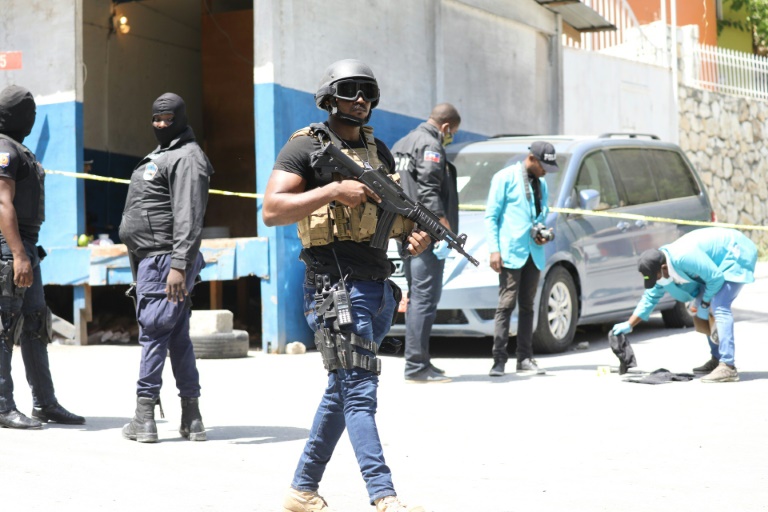Haitian police hunted Thursday for more gunmen behind the assassination of President Jovenel Moise after killing or capturing six “mercenaries,” with the nation under a state of siege.
With the streets of the capital Port-au-Prince tense, and shops, banks and gas stations closed, the poorest country in the Americas lurched close to chaos.
It now has no president or working parliament, and two men claim to be in charge as prime minister. Gangs that regularly kidnap people for ransom control parts of Port-au-Prince.
There was no immediate information on who killed the president or why, or who may have ordered the assassination.
The capital’s airport was closed, as was the border with the Dominican Republic. The two countries share the island of Hispaniola.
Security forces engaged in a shootout with the suspected assailants in the capital early on Wednesday after the overnight attack at the president’s private residence.
Four gunmen were killed by police, and two more taken into custody, while other members of the hit squad are at large, police chief Leon Charles said.
The country is observing two weeks of mourning for the death of Moise.
“Jovenel Moise was not terribly popular but he was the president. He cannot be killed as if he were just an ordinary citizen,” said a 55-year-old man in Port-au-Prince who gave his name only as Paul.
– Where was his security? –
A 28-year-old woman named Julia said she was wary of the police claims that foreign mercenaries killed the president.
“Where were the well-equipped police who watch over the president night and day? Why didn’t they react?” she asked.
In the Petionville neighborhood of the capital on Thursday, a crowd brought two men to a police station and called for them to be lynched.
In total, four men said to be in on the killing were being held at the police station but it was not confirmed that they were actually suspects in the assassination.
Interim Prime Minister Claude Joseph declared a national “state of siege” and said he was now in charge.
Joseph has only been in his post as prime minister for three months, and was due to step down within days after Moise named a replacement on Monday.
Joseph’s replacement, Ariel Henry, said Joseph “is no longer prime minister in my opinion.”
“Does a country have several prime ministers?” asked Henry.
Charles, the head of Haiti’s national police, vowed to catch the president’s killers.
“We are chasing them so that either in the exchange of fire they will be killed or we will apprehend them,” he said.
Moise’s wounded wife Martine was treated at a local hospital then rushed by air ambulance to the Ryder Trauma Center in Miami. Joseph said her situation was stable.
During the assassination, a maid and another domestic staff member were reportedly tied up by the commandos who allegedly shouted “DEA operation” as they burst in.
Haiti’s ambassador to Washington, Bocchit Edmond, said the killers were “professional” mercenaries disguised as US Drug Enforcement Administration agents.
– Political meltdown –
Joseph on Wednesday said the president was “assassinated at his home by foreigners who spoke English and Spanish.”
The unpopular Moise had ruled Haiti by decree after legislative elections due in 2018 were delayed.
As well as presidential, legislative and local elections, Haiti was due to hold a constitutional referendum in September this year after it was twice postponed due to the coronavirus pandemic.
US President Joe Biden condemned the killing as “horrific” and said Washington was ready to assist in any way.
Washington also called for Haiti to proceed with the elections, with the State Department spokesman saying a fair vote would “facilitate a peaceful transfer of power to a newly elected president.”
Moise, a successful businessman, campaigned for power as a populist and was sworn in in February 2017.
The end date of his mandate became the source of a standoff, as Moise maintained that his term of office ran until February 7, 2022, but others said it ended on February 7, 2021.
The disagreement arose after Moise was elected in a 2015 vote that was cancelled for fraud, and then re-elected in November 2016.
Without a parliament, the country fell further into crisis in 2020. Many fear Haiti could be set for deepening violence.
“How much worse can hell get?” asked Haiti expert Irwin Stotzky at the University of Miami.
“Haiti faces even more violence and death and failure as a democratic nation than ever before, which is hard to imagine given its recent and chaotic history.”










